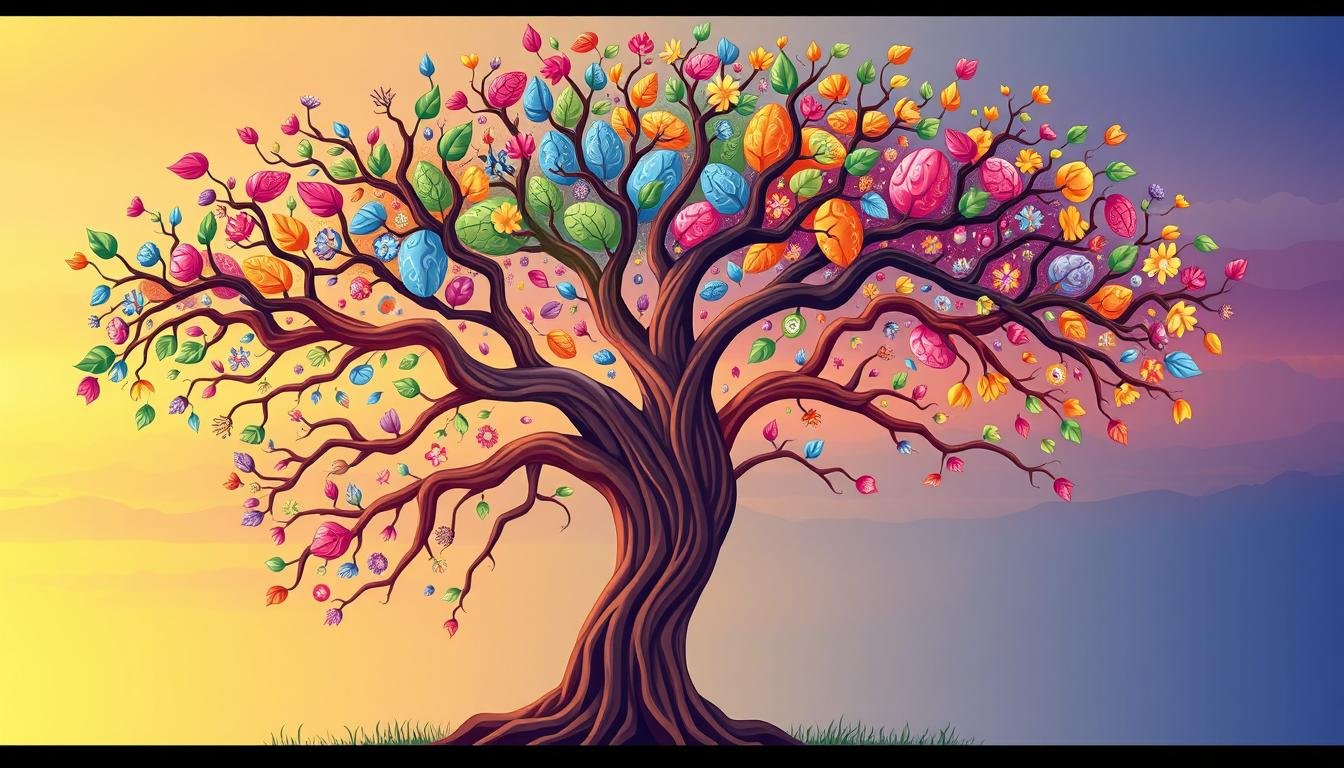Psychosocial Theory: Understanding Human Development
Ever wondered why some people face life’s challenges easily while others find it hard? Erik Erikson’s Psychosocial Theory might hold the key. It’s a groundbreaking way to understand how we grow and form our personalities at different stages of life.
Erikson’s theory says we go through eight unique growth stages. Each stage brings its own challenges that shape who we are. From birth to the end of our lives, these stages shape how we see ourselves and the world.
Erikson’s work is different from earlier theories that only looked at childhood. His theory covers our whole life. It shows how social experiences and relationships are key to our growth, building on Freud’s ideas about personality.
Each stage in Erikson’s theory has a psychosocial crisis – a turning point in personal growth. When we overcome these crises, we gain important strengths. But if we fail, it can cause problems later on.
Knowing about these stages helps us understand our own growth and that of others. This knowledge is very useful for parents, teachers, and anyone who wants to help others reach their full potential.
Introduction to Erikson’s Psychosocial Theory
Erik Erikson’s psychosocial theory changed how we see human growth. It shows how personal and social factors mix to shape us. This theory looks at how we change and grow over time.
Background of Erik Erikson
Erikson was born in 1902. He was a German-American psychologist. His work built on Freud’s, but focused more on social and cultural impacts.
Comparison to Freud’s Psychosexual Theory
Erikson’s theory is different from Freud’s. It focuses on psychosocial crises, not just sexual development. These crises help shape our identity as we go through life’s stages.
The Epigenetic Principle in Development
Erikson believed in the epigenetic principle. It says our development follows a set order. Each stage builds on the last, helping us grow.
| Stage | Age Range | Psychosocial Crisis |
|---|---|---|
| Infancy | 0-1 years | Trust vs. Mistrust |
| Early Childhood | 1-3 years | Autonomy vs. Shame and Doubt |
| Preschool | 3-6 years | Initiative vs. Guilt |
| School Age | 7-12 years | Industry vs. Inferiority |
| Adolescence | 12-18 years | Identity vs. Role Confusion |
Erikson’s theory gives us a full view of human development. It shows how social and cultural factors shape our personalities and identities over time.
The Eight Stages of Psychosocial Development
Erik Erikson’s theory breaks down life into eight stages. Each stage has a unique crisis that shapes who we are. These stages cover from infancy to late adulthood, affecting our personality.
Our journey starts in infancy with Trust vs. Mistrust. This stage sets the base for our future relationships. As we grow, we face challenges like Autonomy vs. Shame and Doubt in early childhood.
In preschool years, we deal with Initiative vs. Guilt. School-age children struggle with Industry vs. Inferiority. Adolescents then face Identity vs. Role Confusion, a crucial stage.
Adulthood brings its own set of challenges. Young adults face Intimacy vs. Isolation. Middle-aged individuals deal with Generativity vs. Stagnation. Older adults reflect on their lives through Integrity vs. Despair. Each stage shapes our ego identity.
| Stage | Age Range | Psychosocial Crisis | Key Impact |
|---|---|---|---|
| Infancy | Birth – 18 months | Trust vs. Mistrust | Developing trust and security |
| Early Childhood | 18 months – 3 years | Autonomy vs. Shame and Doubt | Fostering independence and self-esteem |
| Preschool | 3 – 5 years | Initiative vs. Guilt | Building self-confidence and purpose |
| School Age | 5 – 12 years | Industry vs. Inferiority | Developing pride or facing inferiority |
| Adolescence | 12 – 18 years | Identity vs. Confusion | Forming strong identity or experiencing confusion |
| Young Adulthood | 18 – 40 years | Intimacy vs. Isolation | Building committed relationships or facing loneliness |
| Middle Adulthood | 40 – 65 years | Generativity vs. Stagnation | Finding satisfaction or experiencing frustration |
| Late Adulthood | Over 65 years | Integrity vs. Despair | Reflecting on life with satisfaction or regret |
Understanding these stages helps us see the complexity of human development. Each crisis offers a chance for growth and self-discovery. It shapes who we become as individuals.
Trust vs. Mistrust: The Foundation of Personality
The first stage of Erik Erikson’s psychosocial theory, trust vs. mistrust, shapes a child’s worldview and personality formation. This crucial period, from birth to around 18 months, lays the groundwork for future relationships and emotional development.
The Role of Caregivers in Developing Trust
Caregivers play a vital role in fostering trust during infancy. They do this by responding to nonverbal cues, meeting needs consistently, and providing comfort. This creates a safe environment. It helps form strong bonds of attachment, both psychologically and physiologically.
Importance of Consistent Care and Affection
Consistent care and affection are key to navigating this stage successfully. When caregivers meet both physical and emotional needs, infants develop trust in themselves, others, and the world around them. This trust forms the foundation for healthy relationships and emotional expression later in life.
Long-term Effects on Relationships and Worldview
The outcomes of the trust vs. mistrust stage have profound impacts on future development. Children who learn to trust in infancy are more likely to form positive relationships throughout life. Those raised in untrustworthy environments may face challenges such as depression, social disengagement, and difficulty trusting others.
Erikson’s theory highlights the importance of early experiences in shaping ego identity and personality formation. By understanding this crucial stage, we can better support healthy development in infants and promote positive outcomes in later life.
Autonomy vs. Shame and Doubt: Developing Independence
The second stage of Erik Erikson’s theory happens between 18 months and 3 years. It’s all about learning to be independent and in control.
At this time, kids start to want to do things on their own. They make simple choices and check out their surroundings. Parents are key in helping kids feel independent. They do this by letting kids make decisions, play alone, and feel supported.
When kids get to decide for themselves, they grow more confident. This confidence is the start of being able to rely on themselves and make good choices.
“Autonomy allows children aged 18 months to 3 years to gain personal control, fostering independence and confidence.”
But, if parents are too strict or critical, kids might feel ashamed or doubt themselves. Kids who don’t get to explore or choose might have trouble with self-esteem and making decisions later. This can even lead to serious issues like depression and anxiety.
To help kids grow well during this time, parents should:
- Let kids make choices that are right for their age
- Give them a safe place to explore
- Be there to support and reassure them
- Not be too hard on them or control too much
By finding the right balance, parents can help their kids thrive. This way, kids can develop a strong sense of self and avoid feeling ashamed or doubtful.
Initiative vs. Guilt: Exploring Personal Power
Erik Erikson’s third stage of psychosocial development is initiative vs. guilt. It happens from ages 3 to 5. This is when kids start to show self-direction and personal power.
The Emergence of Self-Direction
At this time, kids start to control their world. They try new things without being too scared of failing. Through play and socializing, they find their purpose.
Balancing Independence with Expectations
Parents face a challenge as kids want more control. It’s important to balance giving them freedom and setting limits. Too much direction can make kids lose confidence.
Developing Purpose and Ambition
Success in this stage means finding the right balance between initiative and guilt. Parents are key in helping kids take charge and make good choices. Teaching kids to see mistakes as learning helps avoid too much guilt.
| Aspect | Initiative vs. Guilt Stage | Industry vs. Inferiority Stage |
|---|---|---|
| Age Range | 3-5 years (Preschool) | 6-11 years (School Age) |
| Crisis | Purposeful Play vs. Excessive Pressure | Growth Mindset vs. Fixed Mindset |
| Educational Implications | Foster imaginative play and curiosity | Promote learning from mistakes |
| Well-being Focus | Develop sense of agency | Celebrate individual strengths |
Psychosocial Theory in Adolescence and Adulthood
Erikson’s psychosocial theory covers important stages in life, from adolescence to adulthood. These stages influence our identity, relationships, and how we contribute to society.
In adolescence, people face the big question: “Who am I?” This stage is all about figuring out one’s identity and finding their place in the world. Teens try out different roles and identities, searching for their true self.
Young adulthood is about building close relationships. It’s a time to form deep connections with others. Success in this area leads to strong bonds, while failure can lead to feeling alone.
Middle adulthood is about giving back to society. Adults at this stage want to make a difference and help future generations. Those who succeed feel a deep sense of purpose, while those who struggle may feel unfulfilled.
| Stage | Age Range | Key Conflict | Positive Outcome |
|---|---|---|---|
| Adolescence | 12-18 years | Identity vs. Role Confusion | Clear sense of self |
| Young Adulthood | 19-40 years | Intimacy vs. Isolation | Strong relationships |
| Middle Adulthood | 40-65 years | Generativity vs. Stagnation | Sense of purpose |
These stages aren’t always in order. People can go back to earlier conflicts as they face life’s challenges. Knowing about these stages helps us understand ourselves and others better.
Applications of Psychosocial Theory in Modern Psychology
Erik Erikson’s psychosocial theory is widely used in modern psychology. It covers eight stages from birth to old age. This theory helps mental health experts and teachers understand human development.
Use in Clinical Settings and Therapy
In therapy, Erikson’s theory is key for treating mental health issues. The Erikson Psychosocial Stage Inventory (EPSI) helps therapists understand a patient’s development. It guides in making treatment plans for those facing life changes or past conflicts.
Influence on Educational Practices
Erikson’s theory shapes education too. Teachers use it to support students’ growth. For example, early education focuses on building trust and autonomy.
In adolescence, teachers help students find their identity. This matches Erikson’s Identity vs. Role Confusion stage.
Integration with Other Developmental Theories
Erikson’s theory works well with other theories, giving a full picture of growth. It fits with Bandura’s Social Learning Theory, showing how social interactions shape us. Together with Piaget’s and Vygotsky’s theories, it offers a complete view of cognitive, social, and emotional development.
Source Links
- Understanding Erikson’s Stages of Psychosocial Development
- Eriksons Stages of Psychosocial Development – StatPearls
- Erikson’s Stages of Development
- 19.1 Erikson’s Theory of Psychosocial Development
- Psychosocial Theory | Lifespan Development
- Erikson Stages of Psychosocial Development in Plain Language
- What to Know About Erikson’s 8 Stages of Development
- Trust vs. Mistrust: Learning to Trust the World Around Us
- Erikson’s Stage 1: Trust vs. Mistrust – Spring Ridge Academy
- Theory of Human Development – Erik Erikson
- Learning How to Become Self-Reliant in Psychosocial Stage 2
- Autonomy Versus Shame and Doubt
- How Children Develop a Sense of Initiative
- Erikson’s Psychosocial Development Reimagined: Navigating the Modern Journey of Self | American TESOL Institute’s Lexical Press Blog
- Psychosocial Theory
- Erikson’s stages of psychosocial development
- Theories of Adult Psychosocial Development
- Introduction to Psychosocial Development Theory
- Erik Erikson and the Theory of Psychosocial Development
- Contemporary Theories on Development | Lifespan Development








